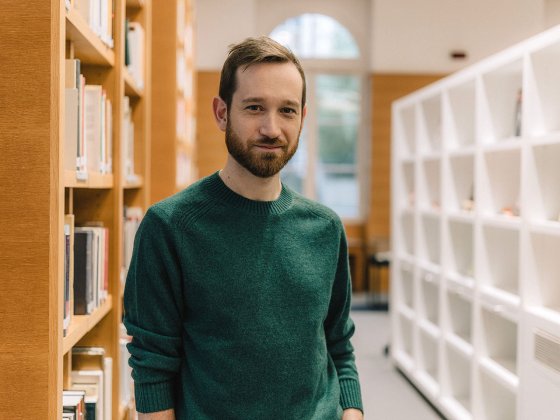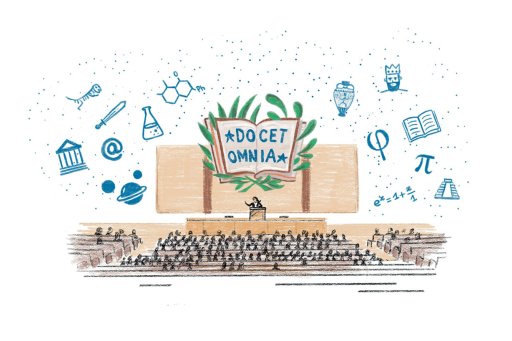The clerks of the Paris parliament in the modern era ! This is the subject of research by Aurélien Peter, a doctoral student at the Collège de France.

Have you always been interested in history ?
I didn't immediately turn to history. After graduating from high school, I worked for several years in music production. For me, history was a reconversion. But in this first job, I had already found great pleasure in carrying out documentary research, sometimes going as far as the archives, to write concert notices or find old scores. You could say that there was a curiosity, an attraction, for the study of old documents.
One of the reasons I decided to study history at the University of Paris 1Panthéon-Sorbonne specifically, was the diversity of the options on offer, which enriched the historian's curriculum. So I did my bachelor's degree while taking lectures in law, philosophy and anthropology... These readings offered a very complete training, with complementary explanations for understanding the workings of human societies and their history. This is what aroused my curiosity about history : the tense link between documents and lives, between groups of men and women whom time has irretrievably distanced from us, on the one hand, and, on the other, archives that have kept traces - partial, partial, intriguing - of their existence.
This is what motivates my thesis work, today, to understand the society of the Modern Era, a period that runs roughly from the 16th to the 18th century. The writings left by and about the staff of the clerks of the Paris parliament, the group of individuals I'm studying, reveal an administration of justice, and more broadly of the state, that was very different from our own, and yet highly efficient, involving specific social hierarchies.
How did your specific interest in judicial history come about ?
Originally, I wanted to do a Master's thesis on a completely different subject, linked to the French Revolution. At the last minute, I had to think hard about why I was doing history. I was reading a book by Jacques Derrida on lying, which made a deep impression on me. I asked myself : what is the history of this concept and what was its importance in societies where orality strongly structured social relations ; what traces do the writings of the modern era keep of words decreed false ; what are the representations that people made of it ?
To address this subject, as an angle of approach to these politics of speech, I focused on the notion of false testimony, and more specifically on the handling of this crime by the magistrates of the Paris parliament. This is how I came across the writings of the parliamentary clerks and their assistants at the National Archives.
Precisely what was a parliament under the Ancien Régime ?
The parliaments of the Ancien Régime are very different from our present-day Parliament, which is the union of the National Assembly and the Senate. The parliaments of the modern era are high courts of justice, made up of magistrates to whom the king has delegated his power of justice, and spread across the provinces of the kingdom. They issue rulings and regulations ; they oversee the proper administration of the people and territory within their jurisdiction. Their decisions set precedents. In addition to their judicial, legal and administrative powers, the parliaments also had a legislative and political role to play: for a royal law to be applied, it had to be registered by the parliaments, which led to tensions and negotiations with the royal government.
The Paris parliament is the largest of these institutions, and plays the most important political role. It is even one of the largest state administrations in modern Europe. Its jurisdiction stretches from Calais to Aurillac, and from La Rochelle to Lyon. In the mid-17th century, the Parlement handed down over forty-five thousand decisions a year, concerning trials, laws, or the operation of the royal administration !
Because of its importance, the Paris parliament is an institution that has been extensively studied by historians. At the end of the 20th century, for example, much attention was paid to the criminal trials held there. The aim was to establish a quantitative history of crime : how many thefts and murders were there, and in which regions ? How often were they committed ? Who were the criminals ? It was with this in mind that I had begun my research into those accused of perjury, and began to consult the interrogatories and judgments written by the Clerks of Parliament and their clerks. But the more I read them, the more I realized that these writings were not to be taken just as means, but as an end. These documents themselves had a history, and a history that had been done very little. I wanted to try and understand, beyond their content, what these documents could tell us about the workings of Parliament, and more broadly of the State. This is how I came to be interested in these writings, their authors, the clerks and their assistants, and the importance of clerks in modern society.
Who are these clerks ?
This is at the heart of my thesis, which focuses on these clerks as part of a history of administrative practices and social hierarchies within the State. At Parliament, there are four clerks, including one for civil affairs - the most prestigious post - and one for criminal affairs. This is a small number compared with the number of magistrates, which exceeds one hundred. In reality, these four individuals supervise the court registries. They are responsible for the smooth running of the procedure; they are the guarantors of the authenticity of acts passed in Parliament and their proper preservation. They are surrounded by individuals who assist and deputize them, known as " clercs " until the 17th century, then " commis ". These auxiliaries carry out the day-to-day work of writing. They transcribed the interrogations of defendants and the decisions of magistrates, drafted judgments, and noted the circuit of trial documents in the legal system. Until the end of the 16th century, each clerk was responsible for a limited number of multi-tasking clerks. Gradually, occupations became segmented and clerks specialized.
All these individuals were well established in Ancien Régime society. The four greffiers were nobles, and from the 18th century, so were the main clerks. Civil clerks often gravitated towards royal circles. Even the clerks who recopy the deeds all day long generally come from what might be called the Parisian middle class.
This is explained by the importance of the Parlement, the highest court in the kingdom, and by the price that had to be paid to obtain these positions. At the time, the administrative functions of the kingdom were offices that could be bought and sold. As with a notary today, the person wishing to occupy an office had to pay a certain sum of money, often to the State and to the last holder of the office. One of the discoveries of my thesis is precisely that the offices of Clerk of the Parliament became among the most expensive offices in the monarchy at the turn of the 16th and 17th centuries. This was due not only to the importance of the function, but also to its profitability, since each act of writing was then " invoiced " to litigants.
Are the clerks of the Parliament of the Ancien Régime like the court clerks we know today ?
Broadly speaking, we could say that today's court clerks are a bit like the " en chef "clerks of ; and today's court clerks, like the " commis " of the time, in the sense that their duties include not only taking notes of hearings and drafting certain decisions, but above all ensuring compliance with procedure and guaranteeing the authenticity of acts.
Secondly, under the Ancien Régime, all clerks were men, whereas today the profession has become much more feminized ; they occupied an office, whereas they became civil servants during the 20th century - except for commercial courts. Moreover, over the long term, their social prestige has declined, as has their remuneration.

What do we find in the documents produced by this administration ?
Judgments written on parchment, lists of trial bags stored at the registries, minutes of sessions, interrogations... and tables and inventories that act as databases for the registries' own staff to find their way around. Some entries are meticulous ; others are very messy. Reading the writings of court clerks from the 16th century can be particularly arduous.
There are some surprising things to read. For example, one of the main clerks of the criminal registry, in the years 1580, is in charge of transcribing interrogations for " question ", i.e. torture. Today, these texts are quite difficult to read. I'm not talking about deciphering them, but about the fact that torture is so far removed from our contemporary concepts of justice. After a day reading interrogations of this type, you always come out in a strange state.
The clerk transcribes the interrogation in indirect style, there to collect the words of the accused, but also to check that normal procedure is followed, that there is no slippage in the executioner's actions. But at certain moments, his handwriting changes. It becomes very legible, round, and the clerk uses the direct style. Only at certain moments : to transcribe the accused's cries of suffering, his prayers. We must be wary of psychologizing this kind of writing, of over-investing the document with intentions, but it is interesting to note how the clerk distinguishes between words that are useful to the trial and others that contribute nothing to the law, but express humanity and perhaps, above all, Christian piety.
How did you go about working with these archives at ?
There was a whole period of data gathering in the archives. During this period, I took a lot of photos and notes on the spot. As I'm working on the form of the text, I need to see the document itself, so I can't just take notes, I need to see the materiality of the document. After that, there was a whole phase of classifying and organizing this material.
At the same time, confronting the documents and their analysis with existing research led to the emergence of hypotheses about the work and lives of these clerks and their assistants. This is how I was able to weave the thread of my thesis on the gradual structuring of the clerks' offices, on this control of information that passes from the hands of the four clerks to the King's Attorney General. In fact, there's a constant flow of research in the archives, reading in libraries and the production of hypotheses that are explored and, sometimes, abandoned. All this led, little by little, to a thesis plan and, today, to the writing of the thesis.
How do you combine your research work with your activities at the Collège de France ?
This year, I'm attached to the chair held by Pr Patrick Boucheron. On the one hand, I'm working on finishing my thesis. Secondly, I'm in charge of the magazine Entre-Temps. Entre-Temps is a digital journal of current history that brings to a wide audience a range of reflections and performances on our relationship with the past, on history and on the plurality of its forms of writing. Each week, the magazine publishes content in a variety of formats, in which researchers, teachers, archivists, artists, etc., take up historical material and experience it in a perspective of transmission or creation.
It's an opportunity to work for the Chair. Writing a thesis is no easy task, and the exchanges with Prof. Patrick Boucheron and his advice on how to stay on track are invaluable. The experience at Entre-Temps is also a very happy one. Thanks to Entre-Temps, I'm reconnecting with my former role in the organization of cultural events. I have to manage the life of the magazine : editing articles, filming interviews and podcasts, organizing round tables... Every day, the subjects covered broaden my perception of what history allows, and of the ways in which it can be written, taught and passed on.
Aurélien Peter is a temporary research associate inProf.Patrick Boucheron 's History of Powers in Western Europe, 13th to 16thcentury chair. He is preparing a thesis entitled " Maîtriserl'information dans une cour souveraine. Pratiques professionnelles et positions sociales du personnel des greffes du parlement de Paris à l'Époque moderne " at the University of Paris 1Panthéon-Sorbonne, under the supervision of Jean-Marie Le Gall.
Photos © Patrick Imbert
Interview by Aurèle Méthivier











